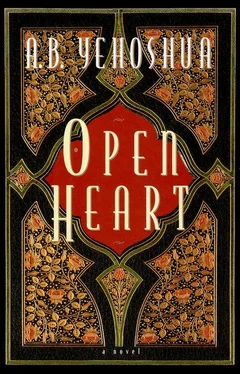A. Yehoshua - Open Heart
Здесь есть возможность читать онлайн «A. Yehoshua - Open Heart» весь текст электронной книги совершенно бесплатно (целиком полную версию без сокращений). В некоторых случаях можно слушать аудио, скачать через торрент в формате fb2 и присутствует краткое содержание. Год выпуска: 2014, Издательство: Peter Halban, Жанр: Современная проза, на английском языке. Описание произведения, (предисловие) а так же отзывы посетителей доступны на портале библиотеки ЛибКат.
- Название:Open Heart
- Автор:
- Издательство:Peter Halban
- Жанр:
- Год:2014
- ISBN:нет данных
- Рейтинг книги:3 / 5. Голосов: 1
-
Избранное:Добавить в избранное
- Отзывы:
-
Ваша оценка:
- 60
- 1
- 2
- 3
- 4
- 5
Open Heart: краткое содержание, описание и аннотация
Предлагаем к чтению аннотацию, описание, краткое содержание или предисловие (зависит от того, что написал сам автор книги «Open Heart»). Если вы не нашли необходимую информацию о книге — напишите в комментариях, мы постараемся отыскать её.
Open Heart — читать онлайн бесплатно полную книгу (весь текст) целиком
Ниже представлен текст книги, разбитый по страницам. Система сохранения места последней прочитанной страницы, позволяет с удобством читать онлайн бесплатно книгу «Open Heart», без необходимости каждый раз заново искать на чём Вы остановились. Поставьте закладку, и сможете в любой момент перейти на страницу, на которой закончили чтение.
Интервал:
Закладка:
I felt an urge to go inside and see the house. After all, I had promised Professor Adler to drop in to see him when I was in Jerusalem, so we could continue our discussion about Lazar’s sudden cardiac fibrillation. He seemed like a serious doctor who was interested in hearing the questions and observations of a younger colleague. It was almost noon. Even the laziest people were already up, and the most industrious could afford an hour of idleness at this time of day on a Saturday. Was it possible that the son, the successful professor, stayed in the same old apartment as his father? I wondered when I saw that there was only one entrance to the house, with an old sign simply saying ADLER, without any first names on the door. I was sure it couldn’t be where my Adler lived. But since the music pouring out of the house had a welcoming sound, I knocked on the door, and a sprightly old German Jew in a sporty sweater opened it. I explained not only who I was and who I was looking for, but also why. It turned out that Adler Junior did not live here but in Ein Karem, near the hospital; only his clinic was here, next to his father’s clinic and residence. In the meantime Professor Adler’s mother came out too, a stout, confident German who had bequeathed her plumpness to her son. What a pity, exclaimed both Adlers, who seemed very suited to each other; they would have phoned their son at home to ask if he could see me, but he had flown to a conference in England yesterday and would only be returning in a few days’ time. “A pity,” repeated the pleasant old man, the well-known cardiologist. “I’m sure he would have wanted to talk to you, Dr. Rubin, about Mr. Lazar’s operation, which we were all very sorry about. I know who you are; he mentioned the fact that you were present at the operation and that you thought of the ventricular tachycardia. He spoke to me a lot about that operation, and although it wasn’t his fault, he was left with an uneasy feeling about the whole thing. True, it isn’t exactly his specialization, it’s more my specialization, but he wants to go into the subject more deeply, in order not to be taken by surprise …” He laid his gnarled old hand on his sweater in the area of the heart, as if he felt a pain there. “I know,” I interrupted him, “Koch’s triangle.” The old man’s face lit up, and his brown eyes, full of humanity, gave me a warm look of acknowledgment. “Yes, Koch’s triangle,” he repeated happily and in an intimate tone, as if he had been personally acquainted with the learned Koch, who had identified the tiny invisible command post of the heart. He invited me in. But the conversation with Professor Adler Senior, which continued for a whole hour in his big study, where the somber library consisted mainly of history and literature rather than medical books, did not help to solve the mystery of Lazar’s death but only increased it. During the course of the conversation I discovered that this famous cardiologist, who had been one of the great names of Hadassah Hospital in his day, was not really interested in the cause of Lazar’s death, having never met the man. His only aim was to protect the reputation of his son, and with this in mind he began to tell me about all kinds of cases of sudden ventricular fibrillations that he had come across in the course of his long career and tried to connect them to Lazar. His wife, who sat next to us and listened attentively to our conversation, interrupted from time to time to mention patients of her husband’s whom she recalled. Although it was very pleasant to sit there between the two kindly old people, protected from the bright midday light outside, and to impress them with both my knowledge and understanding and with my interest and questions, I could not keep my parents from their lunch any longer.
I hurried home, and although I was only half an hour late I saw by the dread on my mother’s face that she had taken my threat with alarming seriousness, and after lunch I decided not to go out again but spent the afternoon dozing in my room, in anticipation of the sleepless nights awaiting me now that I was unable to stay by myself in the empty house. My father too, still tipsy from the wine they had plied him with at the synagogue, sank into a deep sleep. My mother sat up trying to read her novel, but in the end she couldn’t help herself and came into my room to make me swear not to divulge a word of our conversation to my father. Why make him any more miserable than he already was? She didn’t say anything about my threat, as if talking about it added to its reality. But in the evening, when I was already back in Tel Aviv, she took advantage of a brief absence on my father’s part to call and ask how I was feeling now. My vague and detached answers, and especially my fear of not being able to sleep, increased her anxiety, and she suggested that I come back to spend a few days in Jerusalem. “But how can I? I’m expected at the hospital tomorrow.” She thought for a moment and then said that perhaps she or my father, or both of them, could come to Tel Aviv for a day or two. To her surprise, I didn’t turn this offer down immediately. “We’ll see,” I said. “Let’s think about it.” But she persisted, and suddenly she began speaking haltingly in English, which she never spoke to me. If I was thinking of doing anything drastic, I should warn her, at least. “Don’t take us by surprise,” she whispered over the phone, turning the vague threat I had presented her with that morning into something real and alive. “You have no moral right to keep even the thought from me,” she added. “I’ve never hidden anything from you.” And she was right; neither she nor my father had ever hidden anything from me, nor did it seem as if they had anything to hide. “But why are you in such a panic?” I said with grim humor, lying on the sofa with my eyes closed, laying the side of my face on the exact spot where Dori had sat with her legs crossed, listening with excited sympathy to the declaration of love bursting out of me. “Not that I’m really thinking of harming myself, but if you believed in reincarnation, you would find the world less alarming. Because if anything happens to me, I’ll leave you my soul, at least.” But she was in no mood now to understand irony or witticisms on my part.
In the middle of the night the phone rang, shattering the remnants of my brittle sleep. It was Michaela, calling as the dawn rose in Varanasi. Her voice was warm, clear, and joyful. “Varanasi?” I cried in astonishment, and with a note of envy. “I thought that this time you wanted to go to places you haven’t been to before.” “Right,” admitted Michaela, who sounded happy and relaxed, but how could she deprive Stephanie of the chance to touch the open heart of India? Even I, the superficial tourist, knew that the heart was there, in the ghats and temples lining the banks of the Ganges. “And Shivi?” I cried. “What about Shivi?” Shivi too could not fail to be impressed by the spiritual power of Varanasi, because she was now happy and contented after a little restlessness in New Delhi, perhaps because of the diarrhea, which was already clearing up. “But what was it?” The strange cry that escaped me was not only the cry of a father and physician, too far away to save his child, but also the cry of someone in need of salvation himself. But Michaela, who even in her joy grasped my pain, quickly reassured me. I could rely on her. When it came to Shivi there were no compromises. In any case, in a few days’ time they would be in Calcutta, where they would be surrounded by excellent doctors and good friends. “Calcutta again?” I exclaimed in surprise, and the suspicion entered my heart that the doctors of Calcutta were as much an attraction to her as the mystery and fascination of India. “And Shivi?” I couldn’t help bursting out again. “How are the Indians treating her?” And this strange question, which had broken out of me in the hallucination of nighttime, was greeted with excitement. Even an “expert” on India like Michaela would never have imagined that Shivi would arouse such interest and affection among the Indians, who were not accustomed to seeing such a small representative of the West; in her tininess, she exposed the humanity common to us all. When Michaela told them her name, their interest turned to real enthusiasm. “They’re not annoyed that you gave her the name of one of their gods?” I cried, with a tumult of feelings flooding me. But it appeared that not only did they feel no anger, they expressed only joy and admiration at seeing the little creature with her light blue eyes bearing the name of the stern and dangerous god, the destroyer of the world — so much so that people sometimes followed her around. “Be careful, Michaela, for God’s sake, be careful,” I began to shout into the receiver as her voice grew fainter as if it were being carried away in a gale. Then it was completely lost.
Читать дальшеИнтервал:
Закладка:
Похожие книги на «Open Heart»
Представляем Вашему вниманию похожие книги на «Open Heart» списком для выбора. Мы отобрали схожую по названию и смыслу литературу в надежде предоставить читателям больше вариантов отыскать новые, интересные, ещё непрочитанные произведения.
Обсуждение, отзывы о книге «Open Heart» и просто собственные мнения читателей. Оставьте ваши комментарии, напишите, что Вы думаете о произведении, его смысле или главных героях. Укажите что конкретно понравилось, а что нет, и почему Вы так считаете.












